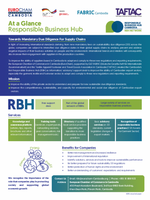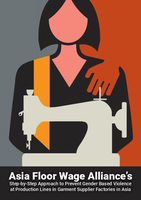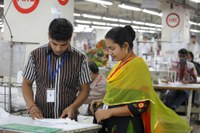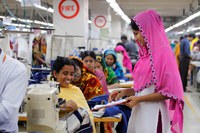Contributions Overview

Factsheet: At a Glance Responsible Business Hub
The RBH is a service help desk for local businesses. It provides tailor-made, free of charge information and advisory services around sustainability and due diligence risk management which will ultimately link the gap between the national and international level actors in the global supply chain of export sectors in Cambodia.

Discover Cambodia's First Responsible Business Hub
In light of increasing global demands for due diligence and sustainability, the European Chamber of Commerce in Cambodia, in collaboration with GIZ FABRIC and TAFTAC, introduces the Responsible Business Hub (RBH). Learn everything you need to know about the RBH here.
Europe needs to step up circular economy efforts, including on waste prevention
The EU’s circular economy action plan aims to double the share of recycled materials used in its economy by 2030. The European Environment Agency’s (EEA) assessment, published today, shows that the pace of progress needs speeding up, requiring both more recycling and less overall material use. A second, in-depth report on waste prevention highlights opportunities for stronger and systemic approach for monitoring progress at EU level.
How Can Companies Recycle Clothes Back Into Clothes?
Polyester is in almost all of your clothing, and it's almost impossible to recycle. Some innovators are looking beyond turning plastic bottles into fabric.
Bangladesh: Government urged to set minimum wage for workers
At a discussion on Monday, labour rights activists and trade unionists urged the government to set a new minimum wage for workers, considering high inflation. Bangladesh Nari Progati Sangha and the Asia Floor Wage Alliance jointly organised the discussion at the National Press Club.
European Parliament makes strides towards effective mandatory HRDD
On 25 April 2023, the JURI committee, leading the EU Corporate Sustainability Due Diligence Directive (EU CSDDD) 1 at the European Parliament, adopted a workable position more closely aligned with internationally recognised due diligence standards than the original proposal by the European Commission.
Ex-ASOS sustainability chief Simon Platts joins circular start-up RE-UP as CEO
Former ASOS Responsible Sourcing and ESG Director Simon Platts has joined start-up RE-UP, which offers a workable solution for circularity and end of life management for retailers.
The impact of fast fashion on garment workers and the environment
On this edition of Your Call’s One Planet Series, we discuss working conditions and labor rights in the clothing industry. It’s been ten years since 1,134 people died in the Rana Plaza garment factory collapse in Bangladesh. Low wages, harassment in the workplace, and union busting are still widespread in the industry. What has changed since the deadly tragedy?
What Causes Garment Workers to Quit Their Jobs?
Codes of Conduct and auditing continue to be the primary methods through which global buyers attempt to uphold labor rights and standards in their supply chains. This form of private regulation was designed and built by global buyers and multi-stakeholder institutions in the global North. Apparel workers in the global South were never consulted in the design and implementation of the codes of conduct that affect their working lives. This begs the questions: “What do apparel workers care about?” “What aspects of codes are most important to them?”
EURATEX: European Textile Industry Increasingly Exposed To Global Pressure
European textile industry is exposed to global pressures more than ever before; policy makers need to consider that global dimension. EURATEX released today its 2023 Spring Report, which analyses latest trade flows for textiles and clothing products.
Japan's Fast Retailing joins new Pakistan Accord for worker safety
Fast Retailing has announced its support for the Pakistan Accord. This legally binding agreement, developed through collaboration between brands and unions, aims to provide increased safety measures for vulnerable manufacturing workers in Pakistan.

This Asia Floor Wage Alliance (AFWA) Approaches Brief presents a step-by-step strategy for preventing gender based violence perpetrated on garment production lines. The principles and approaches that follow are rooted in ten years of organising by AFWA, including establishment of the only Asian-led alliance of trade unions and labour rights organisations, and a widespread legitimacy around a regional bargaining approach for Asian garment workers.



